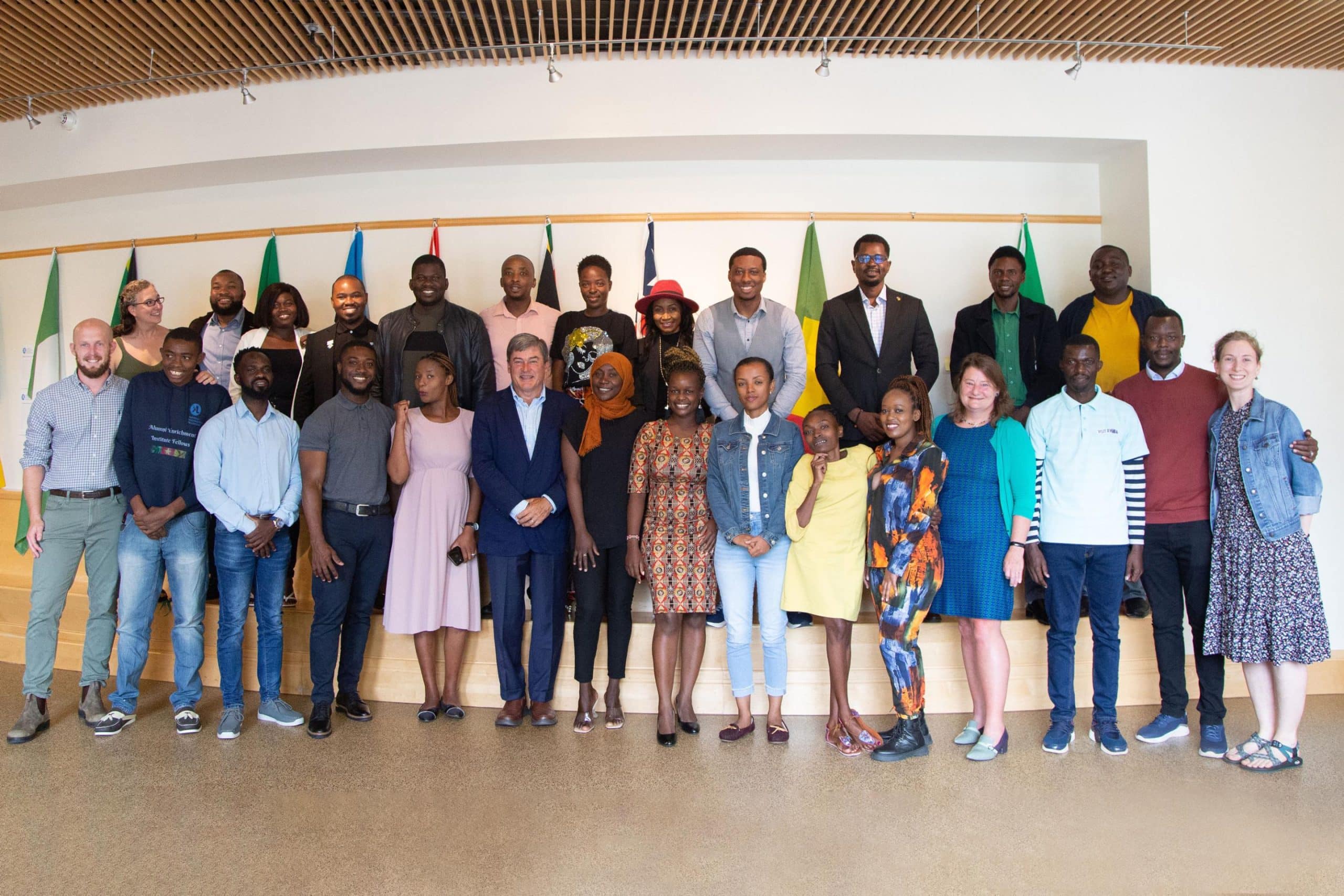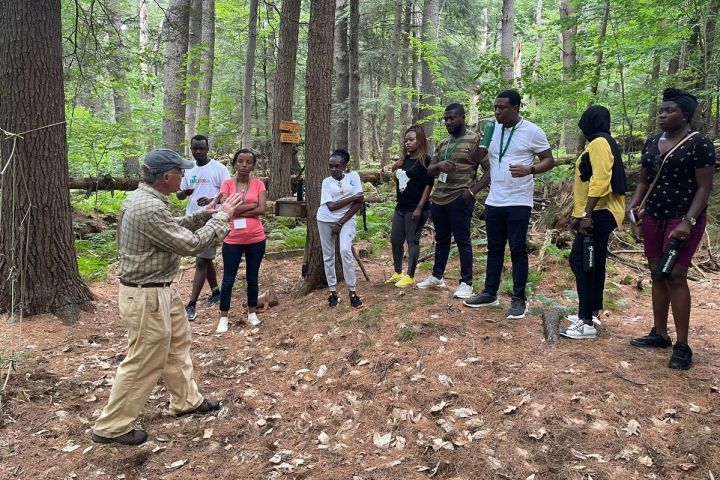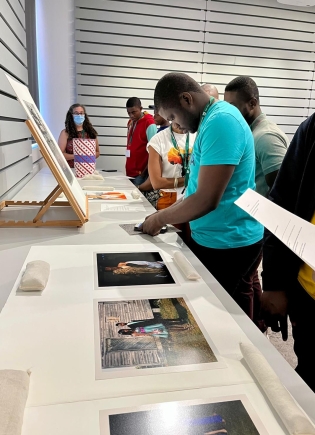
Young African Leaders Return to Dartmouth
Emnet Tesfaye, an emergency medicine physician and public health expert from Ethiopia, came to Dartmouth with the Young African Leadership Initiative in hopes of sharing the lessons learned establishing her country’s first 911 emergency call system. She also wanted to make connections to improve public health for the poor and underprivileged in her country and across the African continent.
Chatting at a reception for the 24 Mandela Washington fellows on the cool side lawn at the president’s house last Monday evening after just two days in Hanover, she already saw the networks growing.
Quote
I have found Dartmouth beyond my expectations. It is beautiful here, and this program has brought us together with many resources.
ATTRIBUTION
EMNET TESFAYE, EMERGENCY MEDICINE PHYSICIAN FROM ETHIOPIA
“I have found Dartmouth beyond my expectations. It is beautiful here, and this program has brought us together with many resources,” says Tesfaye. “I have already communicated with friends from other countries here, and we are going to establish an African alliance of YALI to continue and expand this work.”
At the halfway point of the fellows’ two weeks at Dartmouth with the YALI Alumni Institute, hosted by the John Sloan Dickey Center for International Understanding, the connections and cross-cultural insights continued to build through a full schedule featuring visits to Upper Valley community service partners including Willing Hands, the Upper Valley Haven, and Spark Community Center, as well as cultural and team-building events like a visit to the Hood Museum of Art and a family-style dinner at the Moosilauke Ravine Lodge.
Image

The fellows have also joined discussion sessions with leaders from the Dartmouth Center for Social Impact on community engagement, workshops on resiliency in leadership led by Vincent Mack of the Tuck School of Business, and a tour of the New Hampshire Statehouse and a workshop on governance and community leadership.
Jacky Waiharo, a teacher, disability rights advocate, and Senate candidate from Kenya, and William Marandu, a refugee resettlement and legal aid lawyer from Tanzania, also connected at Dartmouth and have already started discussions about how to provide support for refugees with disabilities.
“What YALI is doing for us as African leaders is amazing,” says Marandu.
“The collaborations are top notch,” says Waiharo. “Also, you get to meet people from different parts of the world. We are meeting people in the same field as us, and who are willing to collaborate with us. It really is a grand opportunity to meet and work with people in the U.S. as well.”
Dartmouth is one of eight educational institutions across the country hosting the Alumni Enrichment Institutes for the 200 visiting alumni of the 2021 Mandela Washington Fellowship program. It gives them an opportunity to travel to the United States to collaborate with American counterparts and continue building on the professional and leadership skills that they developed during their virtual leadership training last year.
“We love the YALI program. It enriches our campus in so many ways and brings great vitality to the summer here in Hanover,” says President Philip J. Hanlon ’77.
In welcoming the fellows at the reception last week, Hanlon said his hope is that they will not only learn about running businesses and nonprofits, but “you will learn some things about Dartmouth and take away some sense of this very unique institution.”
Victoria K. Holt, the Norman E. McCulloch Jr. Director of the Dickey Center, spoke at the reception, saying she was very happy to see them all in person after last year’s Zoom session. She underlined the Dickey Center’s mission, paraphrasing past president John Sloan Dickey, saying “the world’s problems are our problems, and there is nothing that better humans cannot fix.”
Holt told the fellows, “I pass that back, particularly to the Mandela fellows because in reading your bios, understanding what your enterprises are, that seems to be core to what many of you are trying to do.”
Digital storytelling
The project that has attracted by far the most buzz among the fellows is the digital storytelling project led by Susan Simon at the Jones Media Center. All of the participants are developing a digital media presentation telling their personal stories. The fellows began the workshops right after they arrived and will present their final projects over two days at a cultural exchange forum on Aug. 4 and 5 at the end of their Dartmouth visit.
Image

Kayula “Misty” Chisanga works in radio and television in Zambia and uses her platform as a media personality to bring attention and raise funds to support single mothers in her community. At the welcome reception last week, she said everyone is already developing scripts and learning about the digital tools available at the media center.
Although Chisanga has experience with digital and video technology, Simon has done a good job working with the fellows no matter what their level of experience, to guide their work to a higher level, she says.
“When she was talking about techniques, I learned about new ways to tell a story, so even the idea that I originally had when I was coming here has changed,” Chisanga says. “I think it will come out better.”
This year’s fellows program is coordinated by Peter Jenkinson, YALI administrative director and program manager in global studies, and by Amy Newcomb, YALI academic director and senior program officer.
The Young African Leaders Initiative was created by President Barack Obama in 2010 and is funded by the Department of State’s Bureau of Educational and Cultural Affairs and implemented by IREX, a nonprofit that fosters global development and education.
Since 2014, The Dickey Center has hosted the program at Dartmouth, bringing 150 leaders and innovators from 38 countries across Africa to campus over six sessions. The program was on hiatus on campus in 2020 and 2021, primarily due to the COVID-19 pandemic
Source: home.dartmouth.edu/news
